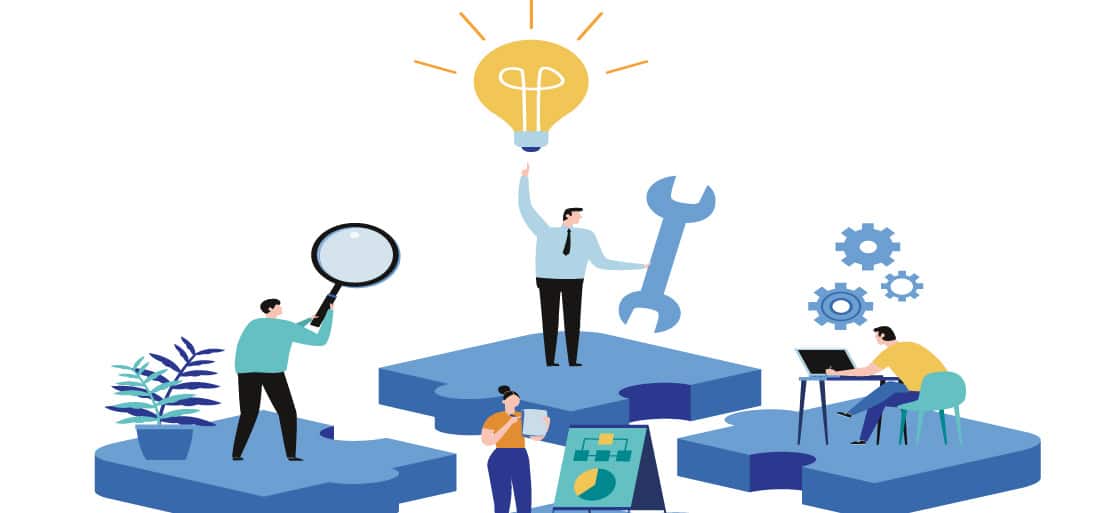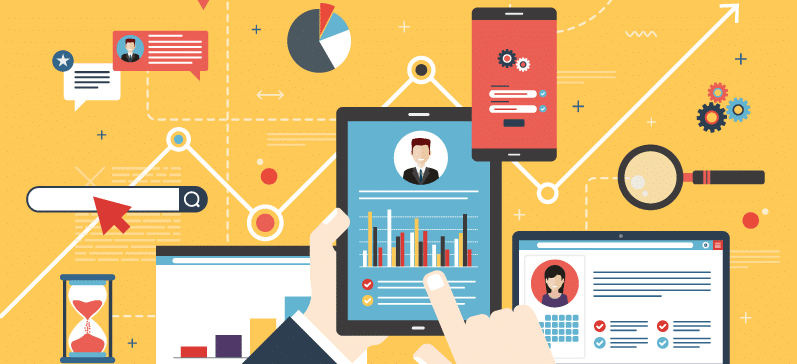The enterprise workplace looks dramatically different than it did a year ago. When COVID-19 turned the world upside, the way we work flipped with it. Think: Remote workforces, tighter budgets and a critical need for seamless collaboration through shared digital access to information and resources.
The post-pandemic enterprise is Work 3.0. Today’s work is faster, more complex and largely disconnected. Yet, the stakes for getting enterprise collaboration right have never been higher. For large enterprise organizations to thrive, teams must work under intense pressure to accelerate delivery and drive profitability for every project. When an enterprise is fully aligned, from top to bottom and across departments, this acceleration is possible, but it requires a next-generation approach that goes much deeper than traditional project management point solutions.
Beyond Project Management
The goal of project management is to guide projects from kickoff to completion through key milestones within a set timeframe. Traditional project management software like Microsoft Project is designed to help achieve that goal. The software was developed for one person, the project manager, to align, coordinate and assign resources to deliver a project on time.
In a post-pandemic work environment, large enterprises live or die by the efficiencies necessary to drive bottom-line profitability. To operate with that level of efficiency takes the seamless, organization-wide collaboration that enterprise work management solutions support, and traditional project management tools can’t.
Enterprise work management combines sophisticated project management, collaboration and real-time reporting features to give distributed enterprise teams—remote office employees, contractors, field services teams, executives and even customers—visibility into the entire lifecycle of work, from order to cash. Enterprise organizations become more agile by managing the entire work cycle, not just siloed projects, because it eliminates slow, disconnected, rigid, time-consuming processes and disparate information. It leads to better P&L oversight and improves financial results.
Unlike traditional project management software designed around structured project management processes, an enterprise work management platform manages both planned and unplanned work, accommodating structured and unstructured processes. It allows teams to do their best work delivering integrated projects by providing an extensible collaboration hub and real-time views into work across projects, departments, divisions and business units. Enterprise work management is an uber orchestrator of projects, interconnected resources and integrated work across an organization. It allows for flexibility and scalability when the unexpected happens.
Enterprise work management enables:
- Resource management
- Project management
- Portfolio management
- Program management
- Capacity planning
- Risk surveillance management
- Multiple work methodologies
- Team collaboration
- Request and approval management
- Mobile access
- Notifications and updates
- Document management
- Workflow automation
- Reports and dashboards
- “My Work” queues
- Real-time business intelligence
Manage Work for Profitability—From Order to Cash—with a Customer Focus
Dependence on multiple, locally deployed software and applications can no longer deliver the flexibility and efficiency required in a Work 3.0 environment, where teams are rarely in the same place and collaboration across functions, disciplines and locations is critical.
Gartner puts it this way, “Collaborative work management platforms help teams accomplish their goals with more flexibility by combining project management and social software capabilities.” Traditional project management tools provide command and control, not interactive team collaboration. They don’t deliver the integrated, extensible and seamless collaborative experience enterprises need to get work done and deliver project profitability.
To manage work to profitability, teams must align from project kickoff to project delivery, and often even as early as the opportunity development stage—from order to cash. This is where traditional project management tools fall short because they only manage individual projects, not the work lifecycle. Sophisticated enterprise work management tools address the entire lifecycle of work with greater visibility, productivity and bottom-line impact. One example of this is integration between enterprise work management and Slack for real-time chat, which enables enterprise teams to quickly access and share project updates to drive organization-wide performance improvements.
Enterprise project management also enables work with a clear customer focus. Forrester says, “Many collaboration technology initiatives fall well short of their transformational potential. But a properly executed enterprise collaboration strategy engages employees and connects the customer experience ecosystem in new ways to create business value.”
Streamline, secure and strengthen project management operations and ensure enterprise-wide business continuity. Get eBook.
Collaborate with Context
Remote collaboration requires access to the same, updated information for context and effective decision making. When distributed teams can sync and share files in one central location in the cloud, it eliminates disconnected spreadsheets and disparate servers, mitigating the risk of decisions based on the wrong data. Enterprise work management provides the data-driven context and clarity enterprise organizations need to reach better outcomes.
When enterprise organizations empower virtual teams to collaborate with context it keeps them aligned and working toward the same goal. With 360-degree project views and dynamic dashboards, everyone sees the latest information, which can be accessed and updated from anywhere, on any device, using sophisticated technology. This results in organizations that support strategic decision making. Managers see customer-centric master dashboards for better customer service and greater project P&L insights. Executives have complete transparency into projects, resources, financials and priorities to better manage enterprise profitability. Even customers have access to customized dashboard data to stay informed on progress.
Adapt and Align Across Methodologies
For optimal efficiency, organizations operate with a variety of work methodologies and use hybrid approaches across projects and departments. Enterprise work management allows multiple methodologies to co-exist, including Kanban, Lean, Agile, Gantt, Waterfall, hybrid, pull-planning and others, adapting and translating for streamlined project and risk management. All methods can be interconnected and unified in a virtual platform to communicate with ease, making progress seamless.
This ensures organization-wide alignment when people are socially distanced in home offices or in clusters of teams in regional satellite locations. It means teams work the way they want from a single system while increasing enterprise efficiency, control and velocity.
Interconnect Enterprise Resources
When teams, data and customers come together, efficiency translates to profitability. In uncertain times, on-time and on-budget becomes more critical, and so does customer satisfaction and loyalty. For large-scale, long-lasting projects across multiple sites, enterprise work management can have a direct, positive revenue impact. As uber orchestrators, enterprise work management solutions manage interconnected resources, timelines and workflows organization-wide. So, teams and customers are always well informed.
When built as an integrated platform with Salesforce, enterprise work and project management solutions can seamlessly connect with applications like Service Cloud, Einstein AI, Community Cloud, CPQ, MuleSoft, Field Service , Vlocity, Chatter, Slack and QUIP and extend capabilities far beyond those of traditional project management. With enhanced analytics and AI-powered automation, these tools transform large-scale project complexity into efficiency across the enterprise. And ultimately, that translates to profitability.
The Next-Generation Solution for Work 3.0
Work 3.0 requires a new approach to how enterprise organizations manage work. Leankor’s enterprise work and project management solution brings people, processes and technology together to drive efficiency that empowers teams to do their best work, keeps stakeholders informed and accelerates delivery. The result is greater profitability across projects and elevated work enterprise-wide. Enterprise work management is the next generation of how enterprise work gets done today, tomorrow and beyond.
To manage your enterprise’s work to profitability through next-generation collaboration, request a Leankor consultation and demo. Call 1.888.532.6567 or email us directly. You can also watch our instructional video to learn more.






